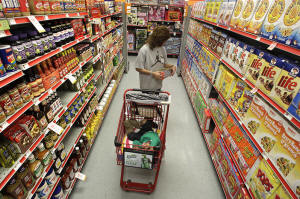RFK Jr. is targeting ultraprocessed foods. What are they, and are they
bad for you?
[March 13, 2025]
By JONEL ALECCIA
In the Trump administration’s quest to “Make America Healthy Again,”
there may be no bigger target than ultraprocessed foods.
Robert F. Kennedy Jr., the nation’s new health secretary, has cited
“highly chemically processed foods” as a chief culprit behind an
epidemic of chronic disease in the U.S., including ailments such as
obesity, diabetes and autoimmune disorders.
Such foods are “poisoning” people, particularly children, Kennedy said
during Senate confirmation hearings. He has vowed to work to remove such
foods from federal programs such as the Supplemental Nutrition
Assistance Program, or SNAP.
“I will do everything in my power to put the health of Americans back on
track,” he told lawmakers.
Key to that goal, however, could be making sure that consumers
understand basic facts about ultraprocessed foods and the role they play
in daily meals.
From sugary cereals at breakfast to frozen pizzas at dinner, plus
in-between snacks of potato chips, sodas and ice cream, ultraprocessed
foods make up about 60% of the U.S. diet. For kids and teens, it’s even
higher — about two-thirds of what they eat.
That’s concerning because ultraprocessed foods have been linked to a
host of negative health effects, from obesity and diabetes to heart
disease, depression, dementia and more. One recent study suggested that
eating these foods may raise the risk of early death.
Nutrition science is tricky, though, and most research so far has found
connections, not proof, regarding the health consequences of these
foods.

Food manufacturers argue that processing boosts food safety and supplies
and offers a cheap, convenient way to provide a diverse and nutritious
diet.
Even if the science were clear, it’s hard to know what practical advice
to give when ultraprocessed foods account for what one study estimates
is more than 70% of the U.S. food supply.
The Associated Press asked several nutrition experts and here’s what
they said:
What are ultraprocessed foods?
Most foods are processed, whether it’s by freezing, grinding,
fermentation, pasteurization or other means. In 2009, Brazilian
epidemiologist Carlos Monteiro and colleagues first proposed a system
that classifies foods according to the amount of processing they
undergo, not by nutrient content.
At the top of the four-tier scale are foods created through industrial
processes and with ingredients such as additives, colors and
preservatives that you couldn’t duplicate in a home kitchen, said Kevin
Hall, a researcher who focuses on metabolism and diet at the National
Institutes of Health.
“These are most, but not all, of the packaged foods you see,” Hall said.
Such foods are often made to be both cheap and irresistibly delicious,
said Dr. Neena Prasad, director of the Bloomberg Philanthropies’ Food
Policy Program.
“They have just the right combination of sugar, salt and fat and you
just can’t stop eating them,” Prasad said
However, the level of processing alone doesn’t determine whether a food
is unhealthy or not, Hall noted. Whole-grain bread, yogurt, tofu and
infant formula are all highly processed, for instance, but they’re also
nutritious.
Are ultraprocessed foods harmful?
Here’s the tricky part. Many studies suggest that diets high in such
foods are linked to negative health outcomes. But these kinds of studies
can’t say whether the foods themselves are the cause of the negative
effects — or whether there’s something else about the people who eat
these foods that might be responsible.

[to top of second column]
|

A woman looks at products in the aisle of a store as her daughter
naps in the shopping cart in Waco, Texas, on Dec. 14, 2010. (AP
Photo/Tony Gutierrez, File)
 Ultraprocessed foods, as a group,
tend to have higher amounts of sodium, saturated fat and sugar, and
tend to be lower in fiber and protein. It’s not clear whether it’s
just these nutrients that are driving the effects.
Hall and his colleagues were the first to conduct a small but
influential experiment that directly compared the results of eating
similar diets made of ultraprocessed versus unprocessed foods.
Published in 2019, the research included 20 adults
who went to live at an NIH center for a month. They received diets
of ultraprocessed and unprocessed foods matched for calories, sugar,
fat, fiber and macronutrients for two weeks each and were told to
eat as much as they liked.
When participants ate the diet of ultraprocessed foods, they
consumed about 500 calories per day more than when they ate
unprocessed foods, researchers found — and they gained an average of
about 2 pounds (1 kilogram) during the study period. When they ate
only unprocessed foods for the same amount of time, they lost about
2 pounds (1 kilogram).
Hall is conducting a more detailed study now, but the process is
slow and costly and results aren’t expected until late next year. He
and others argue that such definitive research is needed to
determine exactly how ultraprocessed foods affect consumption.
“It’s better to understand the mechanisms by which they drive the
deleterious health consequences, if they’re driving them,” he said.
Should ultraprocessed foods be regulated?
Some advocates, like Prasad, argue that the large body of research
linking ultraprocessed foods to poor health should be more than
enough to spur government and industry to change policies. She calls
for actions such as increased taxes on sugary drinks, stricter
sodium restrictions for manufacturers and cracking down on marketing
of such foods to children.
“Do we want to risk our kids getting sicker while we wait for this
perfect evidence to emerge?” Prasad said.
Last year, former FDA Commissioner Robert Califf broached the
subject, telling a conference of food policy experts that
ultraprocessed foods are “one of the most complex things I’ve ever
dealt with.”
But, he concluded, “We’ve got to have the scientific basis and then
we’ve got to follow through.”

How should consumers manage ultraprocessed foods at home?
In countries like the U.S., it’s hard to avoid highly processed
foods — and it's not clear which ones should be targeted, said Aviva
Musicus, science director for the Center for Science in the Public
Interest, which advocates for food policies.
“The range of ultraprocessed foods is just so wide,” she said.
Instead, it’s better to be mindful of the ingredients in foods.
Check the labels and make choices that align with the current
dietary guidelines, she suggested.
“We have really good evidence that added sugar is not great for us.
We have evidence that high-sodium foods are not great for us,” she
said. “We have great evidence that fruits and vegetables which are
minimally processed are really good for us.”
It’s important not to vilify certain foods, she added. Many
consumers don’t have the time or money to cook most meals from
scratch.
“Foods should be joyous and delicious and shouldn’t involve moral
judgment,” Musicus said.
All contents © copyright 2025 Associated Press. All rights reserved |